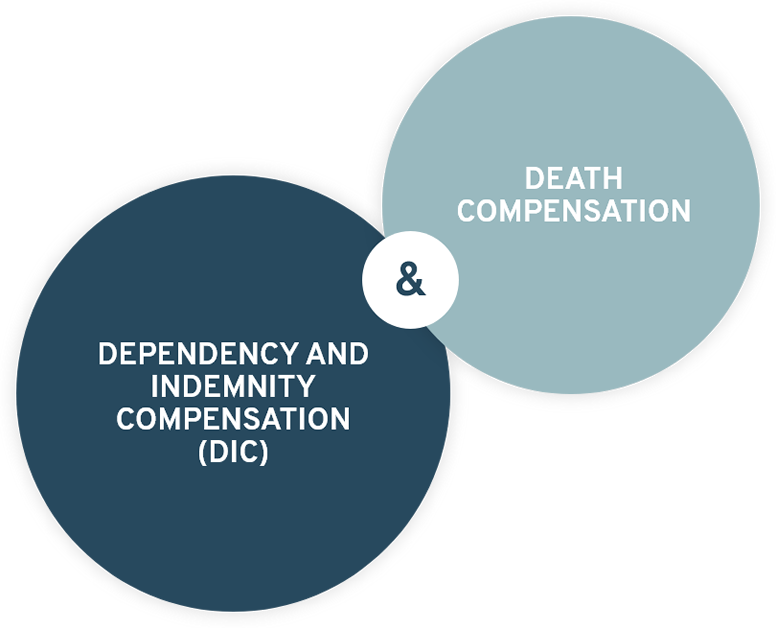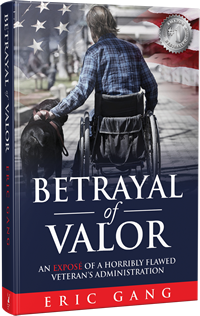If you qualify as a surviving spouse, child or parent of a Veteran, you may be entitled to monthly VA death benefits.

Receiving monthly benefits from the VA can provide your family with an invaluable resource to help support your household in the absence of your late family member who passed due to a service-related condition. DIC or Dependency and Indemnity Compensation, is a tax-free monthly benefit that is paid to the “eligible survivors” of military Servicemembers who died in the line of duty.
DIC also applied to survivors of Service Members whose death may not have happened during active-service but was caused by a service-related injury or disease. To collect these benefits, you’ll need to file the appropriate forms with the necessary evidence to prove your eligibility for DIC benefits and to begin to move forward with the process. Knowing how to request and access the information you need for a successful DIC appeal can be difficult, and our experienced attorneys are standing by to help you pursue the best pathway to your DIC benefits.
If you are looking for a veterans benefits attorney, you have most likely already submitted a claim and had it denied by VA. Paid VA-accredited attorneys cannot represent Veterans in the filing of their initial applications for a fee, however, if your claim has been denied our expertise and experience can meant the difference between an efficient appeal that leads to a reversal, or the ongoing denial of your benefits.
If you believe you qualify for death benefits or Dependency and Indemnity Compensation (DIC) and your claim has been denied by VA, contact our office today at (888) 878-9350 today.
Families Who are Eligible to File for DIC
It is necessary for the VA to approve the circumstances surrounding the death of the military Service Member or veteran in your family, and they must meet one of the following requirements:
- Died due to a service-connected disease or illness
- Died while serving qualifying active duty, active duty for training, or inactive duty training
- Died due to a non-service-connected injury of disease and was totally disabled from his or her service-connected disability for any of the following: 10 years or more prior to death, since the release of the veteran from active duty, and for at least 5 years prior to their death, or at least 1-year preceding death if the veteran was at one time a prisoner of war
When the Service Member meets one of the above requirements, then their surviving dependents will have a right to pursue compensation through DIC.
What types of death benefits are available to surviving family members of veterans?
There are basically two programs that pay benefits to survivors of Veterans whose deaths were service-connected. These benefits are dependents and indemnity compensation (DIC) and death compensation.

Benefits can include a tax free monetary payment for eligible survivors, a survivors’ pension, educational assistance, home loans, health care, educational and vocational training.

You May Apply Online or Use VA Form 21P-534EZ
To begin applying for the DIC benefits you and your family may be entitled to, you can use VA Form 21P-534EZ, or if you are a spouse, dependent, or parent, you may also apply online here.
Find Out What Your Benefits Should Be
Use our disability calculator
When Should I file a claim for death or DIC Benefits?
Keep in mind there is no time requirement for filing a DIC claim. But if a DIC claim is received within one year of the Veteran’s death, the back-pay award for the benefits would go back to the first day of the month following the month in which the Veteran died.
Even if the claim for the underlying disability was made during the Veteran’s lifetime and denied, the surviving spouse can still file the claim for DIC and the VA must consider it as a brand new claim.
The following information is provided to help you improve your chances of getting your VA benefits claim approved.
If you would like to talk to me, Eric Gang, an experienced VA disability attorney at no charge to you, call my office at (888) 912-1739 today.
Contact Our Attorneys Now
100% Free Consultation
Who Qualifies for VA Death Benefits?
-
1
Surviving Spouse of a Veteran
To qualify as a surviving spouse, you must be validly married to the veteran. You must also have proof of marriage. To qualify, you must establish that you were the valid or deemed valid spouse of the veteran at the time of his death.
You may also have to satisfy several other requirements, such as: being married for one year; have continually cohabited with the veteran during the marriage; and not have remarried after the veteran’s death. Keep in mind that the one-year marriage requirement does not apply if the marriage occurred before or during the veteran’s service or if the couple had children at any time.
-
Can I Still Qualify For Spousal Benefits If I Did Not Live With The Veteran For At Least One Year?
With respect to the requirement that you cohabitate with the Veteran there are exceptions to the co-habitation requirement if the separation was due to the misconduct or the actions of the Veteran. The evidence and information that you submit to the VA in support of your claim in this regard will determine whether or not your application is ultimately approved. In practice, this exception typically involves veterans with severe PTSD or other psychiatric problems that result in abusive behavior toward their spouse and family.
It is not necessarily the case that the VA wants to pay out on every claim filed, but rather they require certain information to approve claims, which is why quite a few are denied. While there are exceptions to some rules, taking advantage of them requires a thorough understanding of how the VA applies them - knowledge that our death benefits lawyers can apply to your claim.
In the experience of our veteran’s benefits attorneys, a Veteran may be suffering from extreme cases of PTSD or other psychiatric problems which make living with him or her difficult or impossible. A surviving spouse might also live apart from the Veteran for business reasons. Therefore, a separation occurring under these circumstances doesn’t have to impair a surviving spouse’s ability to qualify for death benefits.
Proving the mental health condition of the late Service Member in your family can be accomplished through the use of supporting statements from personal journals, information from mental health professionals who worked with your family member, and also statements from individuals familiar with how the symptoms of their service-connected disability impacted their ability to engage in social interactions.
-
2
Child of a Veteran
If you are the child of a veteran, you may qualify for death benefits if you are not included in the surviving spouses DIC, you are unmarried, meet certain age requirements and are attending school. In order to receive death benefits, you will need to provide certain evidence about the Veteran, his service and his death.
Accessing this information on your own can sometimes be difficult, particularly if you do not have a positive relationship with other members of your family who filed a separate claim. Working with a death benefits attorney from our VA benefits law firm provides you with the ability to rely on us to advance your appeal. We file the necessary paperwork and requests for information on your behalf to ensure that your application has the evidence you need to be approved in your claim and receive the DIC benefits you are entitled to.
-
3
Parent of a Veteran
If you are the parent of a service member who died in the line of duty or a service related injury or illness, you may qualify for DIC benefits. You must be the biological, adoptive or foster parent of the service member and have income below a certain level. In order to receive death benefits, you will need to prove that the cause of death was service connected.
Dependency is essential to qualify for DIC benefits as the parent of a deceased Service Member who died in a service-connected event or due to a qualifying service-connected injury or disease. You must be unable to provide for your basic needs and/or were dependent upon your relationship with the deceased Service Member in your family.
Surviving parents file VA Form 21P-535, Application for Dependency and Indemnity Compensation by Parent(s) (Including Accrued Benefits and Death Compensation When Applicable). While it may seem that the burden of proof to prove your right to benefits is difficult, if it has been initially declined, you can contract for assistance from one of our death benefits lawyers to help you through every step of the appeals process.
Betrayal of Valor

An exposé of a horribly flawed veteran’s administration
